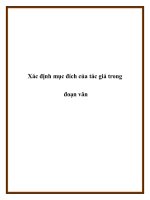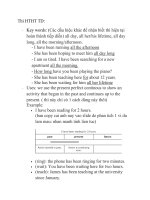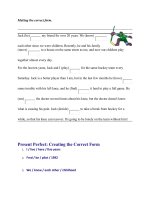Hoan thanh doan van p1
Bạn đang xem bản rút gọn của tài liệu. Xem và tải ngay bản đầy đủ của tài liệu tại đây (356.65 KB, 2 trang )
KHÓA TỔNG ÔN – Cô VŨ MAI PHƯƠNG
HOÀN THÀNH ĐOẠN VĂN_P1
Câu 1: GUIDED CLOZE
Large modern cities are too big to control. They (1) ___________ their own living conditions
on the people who (2) ____________ them. City - dwellers are obliged by their environment to (3)
____________ a wholly unnatural way of life. They lose (4) __________ with the land and rhythm
of nature. It is possible to live such an air - conditioned existence in a large city (5) __________ you
are barely conscious of the seasons. A (6) __________ flowers in a public park (if you have the time
to visit it) may remind you that it is spring or summer. Some leaves (7) __________ to the pavement
may
remind
you
that
it
is
autumn.
(8) __________ that, what is going on in nature seems totally irrelevant. All the simple, good things
of life like sunshine and fresh air are at a (9) ____________. Tall buildings blot out the sun. Traffic
fumes pollute the atmosphere. Even the distinction between day and night (10) _______________.
The flow of traffic goes on unceasingly and the noise never stops.
1. A. exert
B. influence
C. impose
D. affect
2. A. inhabit
B. live
C. dwell
D. reside
3. A. impress
B. express
C. adapt
D. adopt
4. A. communication B. media
C. touch
D. information
5. A. in which
B. that
C. where
D. who
6. A. little
B. few
C. less
D. fewer
7. A. clinging
B. ascending
C. joining
D. attaching
8. A. Except
B. Outside
C. Apart
D. Beyond
9. A. premium
B. minimum
C. least
D. limitation
10. A. has lost
B. is lost
C. is at a loss
D. loses
Câu 2. CLOZE TEST
Read the following text and choose the best answers.
Getting good results in your studies comes from (11) ................... good study habits. The best
place to study is a comfortable room with good (12) ................. The best chair for studying should be
one which you would be comfortable in, (13) ................. so comfortable that you may fall asleep in it
after a while! Before you study, look for a (14) ................. environment with no distractions. If you
find your home too noisy for studying, try the library or community centre (15) ........................
When you study, set (16) ................ targets for yourself to (17) ................. For example, do
not aim to study five chapters of Geography in one (18) .............. when you know that you take more
than an hour to read one chapter. Furthermore, remember not to push yourself too (19) ..............
When you have studied for a period of time, (20) .............. yourself by taking a short break. You
could perhaps take a short walk or listen to some music for a while.
11. A. creating
B. developing
C. getting
D. making
12. A. lighting
B. light
C. brightness
D. shining
13. A. rather than
B. without
C. unless
D. but not
14. A. silent
B. still
C. quiet
D. mute
15. A. then
B. or else
C. just so
D. instead
16. A. real
B. realistic
C. true
D. life - like
17. A. achieve
B. reach
C. fulfill
D. attain
18. A. stretch
B. moment
C. sitting
D. serving
KHÓA TỔNG ÔN – Cô VŨ MAI PHƯƠNG
19. A. strongly
20. A. award
B. hardly
B. reward
C. powerfully
C. compliment
D. hard
D. congratulate
Câu 3
Read the following passage and mark the letter A, B, C or D on your answer sheet to indicate the correct
words for each of the blanks.
Exam or continuous assessment?
How do you feel when you (21)………….an exam? Do you always (22)…………in getting all your
ideas down on paper, or do you sometimes feel that you’re (23).................a mess of it? Apart from those
lucky few who (24)……………through exams, most secondary school (25)………….find them very
stressful. Many teachers are (26)…………of the problems their students face and use a different method
for measuring their progress: continuous assessment. With continuous assessment, students are given
various (27)………….to do throughout the year. All their marks are added together to produce a total
mark at the (28)…………..of the year. Students have to (29) …………..more responsibility for their
education because they can’t rely on doing well on just one day. Also they have more time to
(30)…………….over their work, meaning that they’re able to do their best.
21. A. Write
B. sit
C. giver
D. make
22. A. manage
B. achieve
C. succeed
D. pass
23. A. making
B. having
C. taking
D. doing
24. A. sail
B. go
C. move
D. drive
25. A. pupils
B. classmate
C. prefer
D. colleagues
26. A.knowledgeable
B.recognisable
C. aware
D. intelligent
27. A. efforts
B.tasks
C. achievements
D. result
28. A. finish
B. end
C. edge
D. stop
29. A. get
B. take
C. do
D. make
30. A. imagine
B. consider
C. think
D. examine
Câu 4
Read the following passage and mark the letter A, B, C or D on your answer sheet to indicate the
correct words for each of the blanks.
Around the age of sixteen, you must make one of the biggest decisions of your life. Do I stay
on at school and hopefully go on to university (31)_____? Do I leave and start work or beginning a
training (32)_____? The decision is yours, but it may be (33)_____ remembering two things:
there is more unemployment (34)_____ who haven’t been to university, and people who have the
right (35)_____ will have a big advantage in the competition for jobs. If you decide to go (36)_____
into a job, there are many opportunities for training. Getting qualifications will (37)_____ you to get
on more quickly in many careers, and evening classes allow you to learn (38)_____ you earn.
Starting work and taking a break to study when you are older is (39)_____ possibility. This way,
you can save up money for your student days, as well as (40)_____ practical work experience.
31: A. after
B. later
C. then
D. past
32: A. school
B. class
C. course
D. term
33: A. worth
B. necessary
C. important D. useful
34: A. between
B. among
C. with
D. through
65: A. notes
B. papers
C. arts
D. skills
36: A. straight
B. just
C. direct
D. rather
37: A. make
B. help
C. let
D. give
38: A. where
B. while
C. when
D. what
39: A. also
B. again
C. another
D. always
40: A. getting
B. making
C. taking
D. doing









